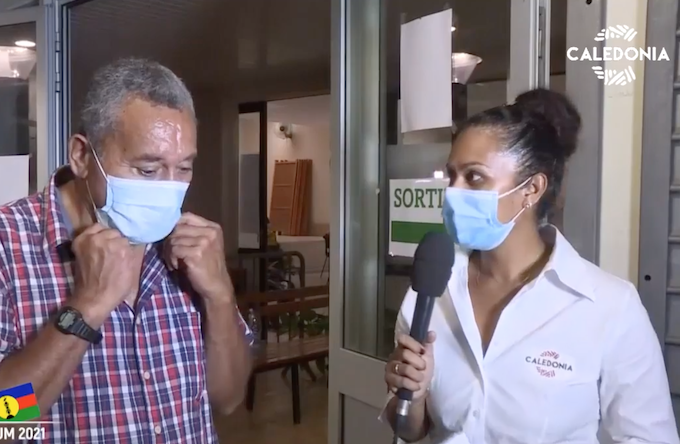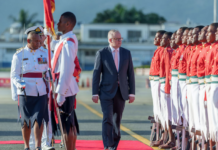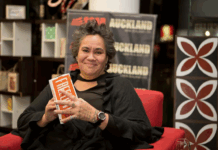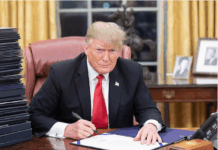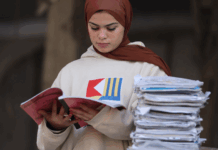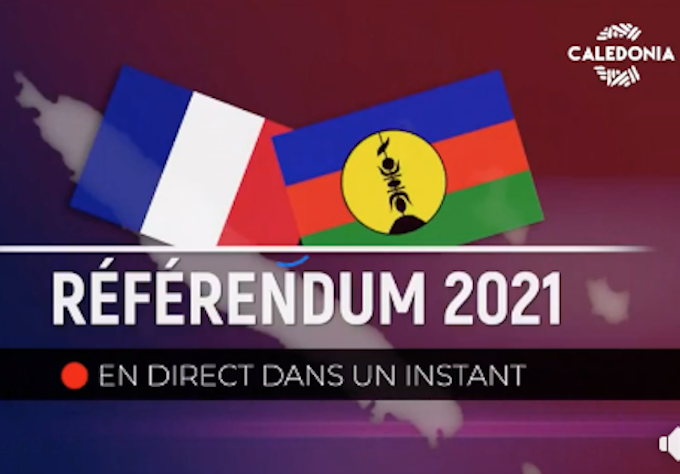
Voters in New Caledonia have overwhelmingly rejected independence from France in a referendum spurned by a massive boycott from the pro-independence camp.
With vote counting almost complete, unofficial results last night showed more than 95 percent had voted against independence in the third and last such plebiscite under the 1998 Noumea Accord.
Pro-independence parties had called on their supporters not to vote after France refused to postpone the referendum because of the impact of the pandemic on the indigenous Kanak population.
- READ MORE: Betrayal of Kanaky decolonisation by Paris risks return to dark days
- Independence for Kanaky: A media and political stalemate or a ‘three strikes’ Frexit challenge? — Backgrounder
- I support Kanaky New Caledonian independence – but why I’m not voting
- Other New Caledonia referendum reports
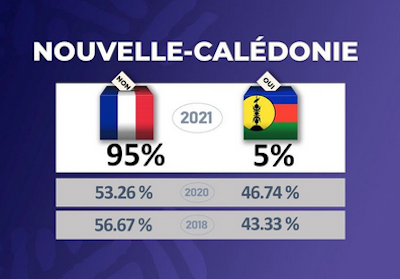
The customary Kanak Senate had declared Sunday to be a day of mourning for the 280 people who died in the pandemic.
The French High Commission said voting was peaceful and there were no incidents.
All communes voted against independence, including those where last year more than 90 percent voted for independence.
On Belep, turnout was 0.6 percent, while on Lifou, which is also a mainly Kanak island, some voting stations had not a single voter.
However, anti-independence leaders welcomed the result.
Philippe Michel, a Congress member since 1999, said the voters’ verdict was “indisputable”.
Gil Brial, who heads MPC, said the victory was not only a legal one but also a political one because it was the pro-independence parties which had demanded the third referendum.
Nina Julie of Generations NC said this victory meant that New Caledonians would keep their French passports.
Before the vote, the pro-independence parties said they would not recognise the result, and ruled out any negotiations on any future status before next April’s French presidential election.
They also ruled out meeting the French Overseas Minister Sebastien Lecornu who arrived in Noumea at the weekend for post-referendum negotiations.
New Caledonia rejects independence from France in referendum boycotted by separatist camp https://t.co/2ZcBgLex8g pic.twitter.com/ZbbAsit4Tf
— FRANCE 24 (@FRANCE24) December 12, 2021
The decolonisation mechanism, at play with two main accords since 1988, has now reached its formal end without the full participation of the colonised Kanak indigenous people at the centre of the process.
New Caledonia has been on the UN decolonisation list since 1986.
Pro-independence parties said before the plebiscite that in case of a third no vote they would seek direct bilateral talks with Paris on the territory’s decolonisation.
The December date for the referendum was chosen by Lecornu in June after he dismissed calls by the pro-independence parties to hold it in late 2022.
His position echoed the consensus that the referendum date should in no way overlap with the campaign period for the French presidential and legislative elections due next year.
France’s nickel-rich Pacific territory of New Caledonia votes in a third and final referendum on independence, with some of those wanting to break free demanding a boycott because they say the Covid pandemic is preventing a fair ballot https://t.co/CjomUQk4r0 pic.twitter.com/LtdXFfHC8C
— AFP News Agency (@AFP) December 12, 2021
In the two preceding referendums under the Noumea Accord, the percentage of people voting no fell from 56.7 percent in 2018 to 53.3 percent in 2020.
After the 2018 referendum, the then French prime minister Edouard Philippe expressed satisfaction that all agreed on the indisputable nature of the result of this referendum.
With the overwhelming no vote, today’s referendum decision puts the onus back on France to find a new way to accommodate the Kanaks’ right to self-determination.
This article is republished under a community partnership agreement with RNZ.
